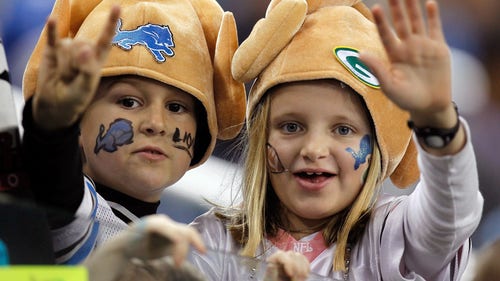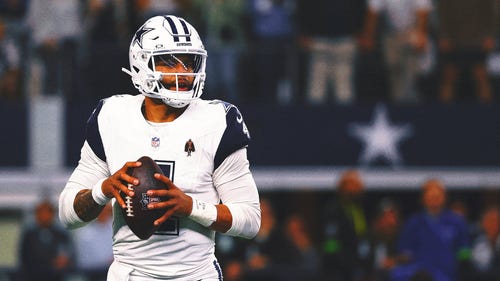
The All-Burke Team: Unheralded NFL prospects who won over our draft analyst
So much of draft coverage is focused on what will happen during Round 1. The teams that churn out the best overall classes, though, do just as much work in Rounds 2–7 as they do as the first 32 picks fly off the board.
Our top-40 Big Board covered the top prospects available in this this year’s draft class, so this space is reserved for those players not on that Big Board who won me over during the process. If I was helping to make decisions for an NFL team on draft weekend, I’d be banging the table for these players when the time came.
My “draft crushes,” as it were. The All-Burke Team of prospects. They may not all turn out to be stars, but after studying hundreds of 2017 draft hopefuls, these are the players—beyond those occupying the Big Board—that I would not bet against.
• Think you can predict every Round 1 pick? Play the Peter King Mock Draft Challenge
Had Evans returned for another year at Virginia (as just about everyone agrees he should have, from an NFL perspective), he could have been a top-100 prospect in 2018. As it is, he’ll make for an intriguing option on Day 3. When a team thinks QB in that range, it does so with the understanding that said QB will be a long-term developmental project. The goal is to find some traits that translate. Evans, at a big 6' 3" and 232 pounds, with a strong arm and dual-threat ability (846 yards, 12 TDs rushing last season), fits the bill. Give me this kid and let’s see what he turns into over the next couple years.
Darren Sproles long has been one of my favorite NFL players to watch, so I may just have a thing for undersized scat backs. Pumphrey’s ceiling is Sprolesesque—he has the vision in the open field and quick-cutting feet to be deadly with the ball in his hands, as was evident en route to an NCAA-record (with an asterisk) 6,397 yards rushing.
OK, so at least I’m not one-note in my preference at running back—Conner is almost a full 180 from Pumphrey on the scale. A physical, hard-nosed player, Conner is a load to bring down at upwards of 230 lbs., and at minimum should be a short-yardage/red-zone option for an NFL team. Don’t sleep on his all-around game, though. Made a bigger part of the passing attack in 2016, he caught 21 balls and showed enough burst to work open out of the backfield.

During an episode of our "On the Clock" draft podcast, I compared Henderson’s upside to Antonio Brown, so ... I am on board. Henderson, obviously, has a looooooooong way to go before even approaching Brown’s range, but he excels in similar ways. Louisiana Tech just force-fed him the ball and let him get to work (19.6 yards per catch for his career).
Like Henderson, a yards-after-catch stud. Stewart is about as raw as NFL receiver prospects come when it comes to the intricacies of his position, but at bare minimum he is a home-run threat every time he touches the ball.
• Want even more NFL Draft intel? Check out Pro Football Focus’ 2017 NFL Draft Pass
Closer to the Evan Engram breed of tight end—in other words, almost a glorified slot receiver—than that of O.J. Howard or David Njoku. Call him whatever you want, Everett has the athletic profile to be a productive move TE at the next level.
Remember Germain Ifedi, the Seahawks’ 2016 first-rounder? In part because of Gennesy’s presence at left tackle, Texas A&M kept Ifedi on the right side during the ’16 season. Gennesy needs to be coached up, but he brings athleticism and that experience playing the blind side vs. SEC foes.
It wasn’t all that long ago this draft season that people were mentioning Tyron Smith as a ceiling for Garcia. Even in Draft Crush land, that’s pushing it, but a few looks at the 6' 6" Troy tackle can make that comparison seem less outlandish. Garcia can get out on the move and overpower defenders.

Feeney is not far removed from the top-40 cutoff line of eligibility. He’s a plug-and-play Day One starter up front, a strong blocker that a team can run behind on a regular basis. If Forrest Lamp gets a shot at tackle, Feeney could be this draft’s top guard.
An FCS product, with a bit of a checkered FBS background. Dunker started his college career at Florida, then transferred to Tennessee State after an arrest for stealing a scooter landed him on suspension. On the field, the talent is there. Dunker has experience at both guard and tackle, and he should be appealing to NFL teams as an athletic guard.
There are not a lot of 6’6" centers—Pocic was an OT recruit, then moved to the interior for LSU, seeing time at both guard and center. He could be an NFL starter either spot, but his solid, smart play for middle of the line should be good enough for a team to pull him from Day 2 and make him a starter.
Mathis probably would be on more radars had he not missed most of the 2016 season with a foot injury. When he was healthy and in the lineup, Mathis consistently produced for the Huskies. He outplays any size/athleticism limitations he may have.
He was a 10.5-sack player off the edge for Chattanooga last season, and he added a sack of Iowa QB C.J. Beathard in the Senior Bowl. He carries some pop at 271 lbs., though, and could project as an inside-outside D-line defender if an NFL team wants to shuffle him around a bit. Don’t bet against him.

Even on a team full of draft crushes, Ogunjobi stands out. He’s a player I would be in the war room begging for as early as Round 2. Ogunjobi is a 300-plus pounder who can line up over the ball, as he did often for Charlotte, but really has potential as a penetrating three-tech.
Every team, understandably, wants linemen capable of collapsing the pocket, even from the DT spots. But a good defense needs those early-down defenders, too, and Jones is a rock against the run. Bare minimum, he should be able to plug those holes inside. If he ever does show himself capable of bringing the heat on a QB, the sky’s the limit.
Apparently, I’m on the Wisconsin linebacker bandwagon—Joe Schobert, now of the Browns, was a favorite of mine headed into the 2016 draft, and Biegel’s here this year. The latter gets knocked around at times, but he also flies to the football with sub-4.7 speed.
Two areas where Brown can help immediately: special teams, where he was excellent for UCLA thanks to how well he gets to the ball and tackles; and in coverage. Brown has a little of former teammate Myles Jack in him in that regard—he’s undersized but capable of hanging with any matchup on passing downs.
It’s tough to define "instincts" in a football player—it’s kind of a catch-all buzzword when a player makes a ton of plays, without any obvious explanation for how. And so it kind of fits here. Vallejo does have decent speed (4.67, same as Biegel), but he’s hardly one of the top athletes at linebacker in this class. Yet, he always seems to find his way to the ball. If he’s over the wrist injury that held him back last year, he could be a productive tackler inside of a 3–4 defense.
Wilson stands over the coveted 6-foot line for NFL cornerbacks, although he is on the lanky side 184 lbs. Regardless, he plays with heat as a tackler and he displays an advanced understanding of what’s happening in front of him. To wit: 15 pass break-ups and five picks in his final Houston season.
Sutton had just one INT during an injury-plagued senior season, but it was a doozy—he peeled off his assignment to drop about 15 yards and make a diving grab vs. Appalachian State. That’s the selling point for Sutton: his IQ as a pass defender. He started 45 games for the Volunteers and can be trusted in man or zone.
Overshadowed by Michigan’s more high-profile defensive prospects, Hill himself has a bright NFL future. He is an aggressive strong safety, with the coverage chops to move around a defense based on matchups. Another mid-rounder with starter upside.
What teams are drooling over when it comes to Ohio State’s Malik Hooker, Williams can offer a round or two later. He has great range as a deep safety, plus the sideline-to-sideline ability to be in a single-high look. Williams also tested well at the combine in February. A sleeper to hear his name called in the closing moments of Round 1.










